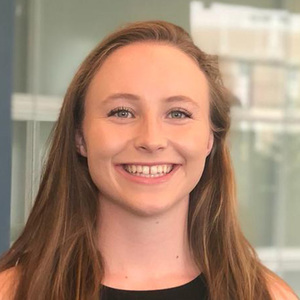Ellen Joyce

Class of 2019-2020, Naughton Fellowship recipient
Trinity College, Dublin, 2019
Management Science and Information Systems Studies
By the time COVID-19 forced Ellen Joyce to return to Ireland in March and complete her ESTEEM program remotely, she was already putting into practice the lessons of the program’s early months as she built her own startup, Digital Leader Academy. Now the company has pilot programs at Riley High School in South Bend as well as Joyce’s high school alma mater in Ireland, where her one time English teacher is now principal.
Digital Leader Academy brings high-tech education and experience on such topics as artificial intelligence and blockchain to high school students, equipping them to meet the current needs of the workplace. The company is partnering with SIMBA Chain of South Bend to develop a blockchain curriculum.
“We create curricula on emerging technologies for high schools,” Joyce says. “It all falls under career and technical education. The aim is to get students ready for the workforce possibly without going to college.”
The company offers both a year-long computer science curriculum, a combination of entrepreneurship, business, and technology where students enact the duties of a company CEO. It also offers field-specific units that can be incorporated into other programs, such as blockchain in a healthcare course.
“The aim is to give students real-world examples so they are ready for real-world work,” Joyce says. “What they’re doing in the classroom is exactly what’s outside.”
The company emerged when John Henry, Director of Student Startups at the IDEA Center, introduced Joyce, the only student in her ESTEEM class with an undergraduate degree in computer science, to Jarek Nabrzyski, director of Notre Dame’s Center for Research Computing. Nabrzyski recognized a need for blockchain developers and conceived of a virtual blockchain bootcamp. Alex Topalovic of enFocus joined the conversation and eventually became Chief Operations Officer of Digital Leadership.
“It was an interesting inception,” Joyce says. “It wasn’t my capstone, and it wasn’t just an idea out of a hat. The four of us came together and did a lot of talking to people. What we realized is there is a real disconnect between what people were learning in school and what the industry actually needed.”
For example 40 percent of Indiana high school graduates do not go to college, but the manufacturing jobs once available to them are disappearing and the jobs being created – such as maintenance of the machines that replace workers – require a different skill set.
“There’s this huge national problem that some types of jobs are disappearing and our students are still being trained to do those jobs,” Joyce says. “Nowadays, it’s a lot more techy, and you’;ve got to understand and make sure the computer is your friend not your enemy. Ninety-five percent of kids don’t want to be software developers, but most education is about getting kids to code. You don’t need to code, but everyone does need to have a relationship with technology and be able to understand a computer.”
ESTEEM provided not only the business and entrepreneurial skills required for such a startup but also the community of experts where she can turn in the process, Joyce says.
“ESTEEM has given me not just the theoretical knowledge but also the network I can rely on,” she says, adding that she emailed a professor for advice on negotiating with an investor, for example. “It’s not just the things I’ve learned but also the people I met.”